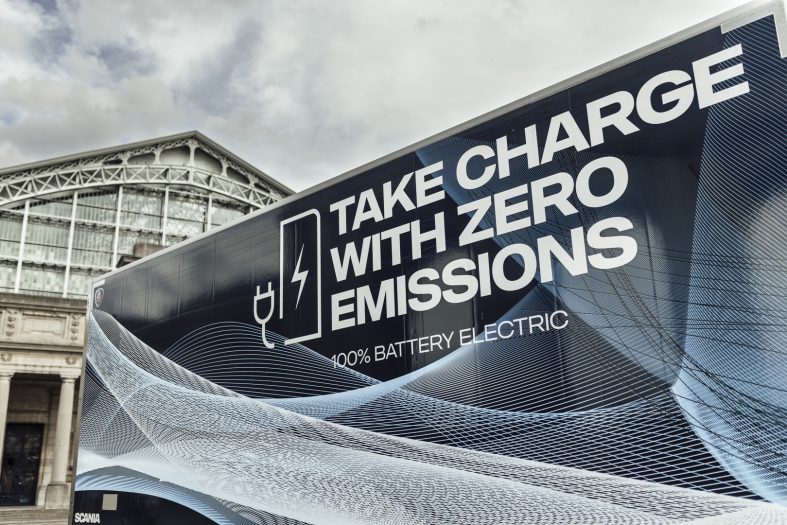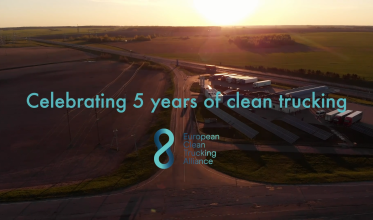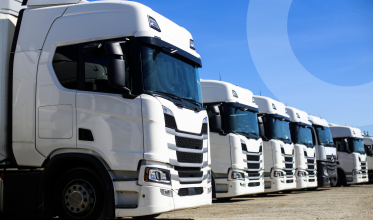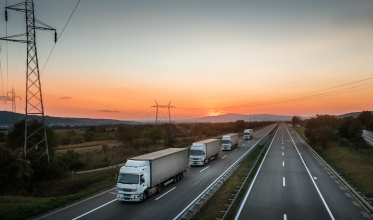Transport operators very much welcome the finalisation of a basic public charging and refuelling network for trucks across Europe’s main roads. The EU’s Alternative Infrastructure Fuels Regulation (AFIR) plan was finalised yesterday by EU policymakers and sets ample charging targets to rapidly roll out zero-emission trucks (ZETs). To be able to smoothly and reliably deploy ZETs quickly, EU countries should start the implementation of the infrastructure plans as soon as feasible.
The European Clean Trucking Alliance, a coalition of major hauliers, logistics and consumer goods companies calling for zero-emission road freight, welcomes this crucial law of the Alternative Infrastructure Fuels Regulation. The AFIR will set binding national targets for EU countries to roll-out a basic public charging and refuelling network across Europe that are designed for the needs of zero-emission commercial vehicles. A swift implementation is now essential to transpose this important law into an enabler of road freight decarbonisation.
With expected rapidly increasing number of zero-emission trucks on European roads, as indicated by truck OEMs, charging infrastructure targets post-2030 should be considered as part of the Commission’s planned review in 2024. The review of targets and power output of the charging hubs should be based on the ZET uptake forecasts and the traffic- density in the different regions.
ECTA spokesperson and representative of logistics company Contargo, Kristin Kahl says: “Road transport operators are ready to transition all their operations to zero-emission – even long-distance trucking. The AFIR is an elementary law to remove the operational hurdle and can ensure that zero-emission trucks are able to transport goods emission-free from one Member State to another seamlessly. After 2030 it should be evaluated whether additional infrastructure is needed once zero-emission truck numbers are deployed in large numbers.”
Transport operators will be able to recharge their electric trucks at one charging pool with 3.6 MW output every 60 km on Europe’s main motorways (core network) and at a pool with 1.5 MW capacity every 100 km for the secondary road (comprehensive) network by 2030. Additionally, by 2030 urban charging nodes will be built in every major European city and four charging points at safe and secure truck parking areas (SSTPA) will be built. The alliance also welcomes the coverage of the TEN-T network with sufficient hydrogen refuelling stations by 2030 every 200km and one refuelling station at urban nodes. It will unlock the refuelling for hydrogen vehicles when market maturity is reached and enable another zero-emission technology to complement the decarbonisation of road transport.
ECTA sees it as important to guarantee that the needed power output at key locations and along the main highways is met by the current proposal in order to match the operational needs of logistic operators. During its zero-emission trucks’ roadshow organised in October 2022, the Alliance showed that the demand for zero-emission trucks is here, stressing the need for public and private infrastructure to follow suit as well as the need for supportive measures such as purchase subsidies for hauliers to overcome the initially higher vehicle prices.
For more details, please see ECTA’s position on the revision of AFIR.
Press contact
Martin Burgat, Secretary of the European Clean Trucking Alliance
More about the Alliance
The European Clean Trucking Alliance is a coalition of over 35+ companies and organisations active in logistics, consumer goods, manufacturing, retail and supply chain management from across Europe calling for zero-emission road freight.
For more information, please visit: www.clean-trucking.eu






